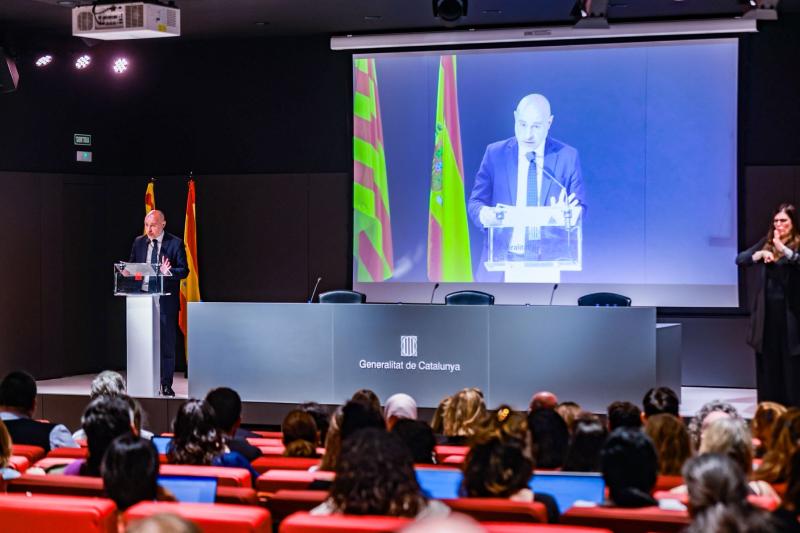· Today the last session took place in Barcelona, with the participation of the Spanish Government delegate in Catalonia and the Councillor for Social Rights and Inclusion
· More than half a thousand people attended the 4 sessions designed to respond to the doubts that may have groups such as entrepreneurs, social entities, agricultural organizations or town halls
Barcelona, May 14, 2025.- The Spanish Government Delegation in Catalonia and the Ministry of Social Rights and Inclusion of the Generalitat have organized informative days on the new regulation of foreigners. The sessions took place in Girona, Lleida, Tarragona and finally Barcelona, today. This last day was attended by the delegate of the Spanish Government in Catalonia, Carlos García Prieto, and the Minister of Social Rights and Inclusion, Mònica Martínez Bravo.
The success of attending the different sessions demonstrates the interest shown by the topic. Specifically, more than half a thousand people have followed the acts. The days were open to everyone who had an interest, but above all they were designed for agricultural organizations, companies, social entities, trade union representatives, public administrations or professional associations.
The delegate of the Spanish Government, Carlos Prieto, for his part, has defended migration as “a necessity” due to the progressive aging of the population and claims the arrival of foreigners as “an opportunity, an indispensable asset for the sustainability of the economic and social system”. The delegate has also called for “the need to combat hate speech and disinformation” that dehumanize migrants.
Carlos Prieto has assured an increase in resources in the Immigration offices to the four Catalan provinces “of between 30% and 40%”, reaching in addition to 750 people throughout the State.
Continuing with figures, the delegate pointed out that by 2024 a total of 290,000 files were resolved, adding the initials (190,336) and the renewals. In the next two years, Prieto predicts, “we could talk about a total of 200,000 people that can be regularized” with this normative change presented. In 2025, more than 54,000 initial files have already been resolved.
Counselor Martinez Bravo highlighted “the potential transformative impact on the lives of many people to streamline regularization processes” that “are the key to fulfilling a life project.” “What could be an administrative procedure is the key to entry for good living conditions and the tools to develop personal, educational, work projects,” he added. Among the benefits of the regulation, he stressed that the reform will facilitate and speed up administrative processes, reduce bureaucracy and open up new ways of regularization, among others. In short, it is "a more realistic, more human and more efficient model," he said.
“Scientific and empirical evidence shows that streamlining regularization processes is hugely beneficial for society,” explained the councilor, who recalled that Catalonia has been a host country in different waves of migration. “One in five people in Catalonia has international migration roots and the migrated population is essential to understand what Catalonia is today and also to be a source of improvement,” he added.
The regulation on foreigners (Royal Decree 1155/2024) was approved last November and will enter into force on May 20th. The main objectives of the reform are to adapt the rule to the current migratory situation, to meet the needs of the Spanish labor market and of migrants, as well as to face the demographic challenge of the country.
Among the main innovations introduced by the new Regulation on Foreigners are:
- Visas: incorporates a specific section for visas with the aim of clarifying the authorization scheme, requirements and procedures.
- Arraigo: Spain is the only state in the European Union that has the concept of rooting to regularize migrants. To the modalities of social, socio-labor, family and *socioformatiu roots, it incorporates a new modality called second chance directed to those people who have had a residence authorization in the last two years and have not renewed it for several reasons. The time of stay in Spain to be able to request a rooting goes from 3 to 2 years and the requirements are relaxed.
- Work authorizations: most of the authorizations regulated in the new regulation enable to work from the first moment, without the need to request in an express way an initial authorization of work for someone else. It includes people who come to study, since they will be able to work up to 30 hours a week. For the seasonal activities, a specific residence and work authorization is created that facilitates recruitment both individually and collectively. The new text promotes entrepreneurs to have more information in the recruitment process and to be better able to adapt to specific needs such as the determined duration or collective management of contracts.
The days have all followed the same format, with a presentation on the main innovations of the new regulation on foreigners, by staff of the Secretariat of State for Migration of the Ministry of Inclusion, Social Security and Migration, followed by a round table with several expert voices and finally questions and debate with the audience.
